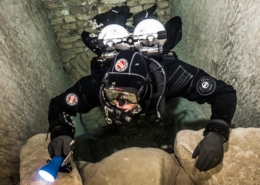Team Teaching: A Tech Diver’s Perspective
By Chris “Doc” Radley
So you’ve been diving for a while and you love it. Each trip to the water makes you want to do more. Maybe you’ve already stepped from Open Water Diver to something a little more advanced. But some things are still out of your reach. No problem though; you can clearly see the answer. You want to be a Technical diver!
Choosing Your Instructor
You watched and listened to the Technical divers on trips you’ve made and with just a bit of jealously wished you could be doing the things they were doing. You’ve done some homework and you know that there are training agencies and instructors that could provide what you need. But you’ve also developed a few concerns. If you’re going to commit the time and money to be a Technical diver you want the right program that addresses those concerns and makes for a fun experience that keeps you coming back for more while managing the increased risks.
- You’ve read about specific instructors and their “system” for doing things. What if that doesn’t feel right? How do you get alternative perspectives? Can there really only be one right way? If it’s not working for me who do I turn to?
- You’ve got to make plans for the training time; what happens if the instructor isn’t available, gets sick, or for some other reason can’t do your training as planned?
Two Can Be Better Than One
The answer is to find someone who offers “Team Teaching”. With two instructors you gain important benefits that address your concerns and more.
- Different perspectives on approaches to skills and choices in equipment. Sometimes just having a different person show you or explain to you the exact same concept can change uncertainty to clarity.
- Differences in setting up your gear, how you gear up, how you enter and exit the dive. Even small changes can mean the difference between something that just works and something that feels right for you.
- With two instructors you have a higher probability that your training will move forward as planned. If one instructor has a conflict or gets sick you still have the other instructor. Even in the event that something happens while diving (even instructors can have ear problems) there is still another instructor to carry on.
- Chances are no two people will be alike not just in their perspectives and teaching styles but even their physiology. Beyond the benefits of the different perspectives, you may find that one instructor is better able to relate to your specific issues that may be related to height, weight, age, etc.
Team teaching doesn’t change the requirements you have to meet to become a Technical diver. It also doesn’t change the fact that for some things safety will always dictate that there is only one correct way to do it.
Team teaching does afford the benefits of providing multiple resources that have multiple experiences and perspectives. When there is room for differences of opinion and making choices you’ll have a better chance to get it. You’ll also have a built-in backup plan to help you get your training done even when one of your instructors isn’t available as planned.
Finding a Teaching Team
Team teaching is not the norm in technical instruction, but certainly can be and is practiced by some instructors. Reach out to other technical divers in your area and ask about any local instructors that offer team teaching. This is often the best option and can limit extra expenses. If travel is necessary, or just a desirable option, throw the net wider. And ask local instructors if they have another instructor they would team teach with. Often times, there is more than one technical instructor at a facility and they may be willing to work together by student request. That also allows more freedom for the instructor to video students, observe them first hand, and remove themselves from the team dynamic underwater, and that alone can make for a better course for the diver.
One last point that should not be overlooked; at the outset of this piece, many of the concerns revolved around the singular view that one instructor could have. Think of this as the “do it my way approach”. You’ve probably noticed that in practice there are many different ways to do things. Keeping an open mind doesn’t mean adopting every new idea that comes along but it does mean at least being willing to consider what merits it may have. It might come as a surprise to many newer divers that things which are commonplace today, whether equipment (BCDs, Aluminum tanks, single hose regulators, even dive computers); gas options (Nitrox, Trimix, etc.) and gear configurations (Sidemount) were once viewed with suspicion.
Team teaching in a technical diving course offers many direct benefits to the diver in that course. When it helps you to learn and keep an open mind it also makes you a better diver. Something we should all aspire to be.










Zanechaj odpoveď
Chcete sa pripojiť k diskusii?Neváhajte prispieť!